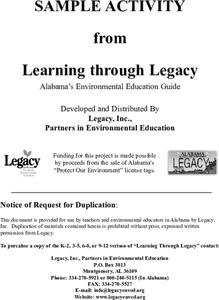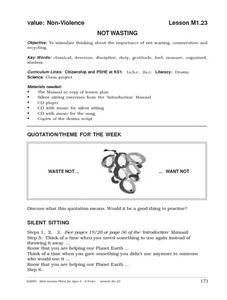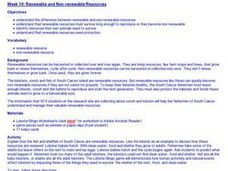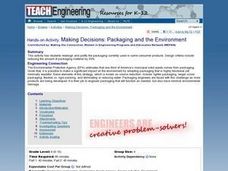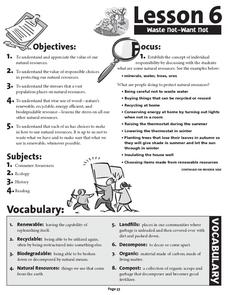Curated OER
Things We Can Learn From a Cow and a Worm
In this conservation instructional activity, students answer 5 questions about how cows and worms recycle and conserve natural resources. Students then fill in a Venn diagram outlining ways they can recycle and conserve.
Curated OER
Floral Magnets
In this art project directions worksheet, children read detailed directions on how to make a silk flower magnet. A list of materials is provided and step by step procedure. A photograph is included of the finished product.
Curated OER
The Recycling Factory
In this density of materials worksheet, students examine ways to sort a dump truck of recycled materials using the density of the material types. Students write a letter to the city council to describe their method of sorting.
Curated OER
Make Your Own Recycled Paper
Paper Lesson Plan - Students discover how paper is made. Working together, they make their own paper. This activity introduces students to recycling; what it is and its importance. Students study the process of how paper is made, and...
Curated OER
The War Lesson Plan
Students view video clips of the film "The War". Several classroom activities are included and address major themes found in the film. The lessons incorporate video clips from the film as well as additional resources provided.
Curated OER
Environmental Responsibility
Young scholars discuss the importance of recycling and preventing pollution. In groups, they complete mini-studies on various environmental issues and evaluate different consumer products. They use global warming data to determine the...
Curated OER
Reduce, Reuse, Recycle
Students brainstorm and share opinions about products that can be reused or recycled after reading the article, "Seattle's Recycling Success Is Being Measured in Scraps." They then investigate, analyze and evaluate articles on recycling...
Curated OER
Organic and Inorganic Recycling
Students examine their role in polluting the environment and discuss the importance of recycling. In groups, they place earthworms into compost piles to observe why they are considered natural recyclers. They also practice sorting a...
Curated OER
Garbage Pizza
Students examine amount of garbage disposed of by average household weekly, classify different categories of garbage and describe composition of landfills, investigate what happens to waste after it is collected by garbage trucks, and...
Curated OER
NOT WASTING
Young scholars brainstorm and analyze creative ways to not waste materials and recycle more as an individual. The theory and importance of conservation is also stressed within this activity. In addition, silent sitting is exercised,...
Curated OER
Talkin' Trash (All About Landfills)
Students investigate the types of waste created by people and identify various options for trash disposal. They read and discuss a handout about what a landfill is and the different types of trash, match types of trash with the proper...
Curated OER
Trash Bashing
Students define trash, garbage, or solid waste, discuss ways of disposing of trash, list examples of biodegradable materials, and have trash relay race in order to sort trash into appropriate containers labeled biodegradable, reusable,...
Curated OER
Lesson 2 Its a Small World (Day 2)
Students are able to explain how the water cycle recycles the earth's water supply. They are able to make use of the knowledge of land forms learned in social studies. Students are able to form a hypothesis on how/why the water cycle...
Curated OER
Bottle Dolls/Figurative Sculpture
Young scholars use water bottles with sand in them (to give stability) They add heads made of crumpled newspaper with masking tape. They paper mache the entire figure and make them into people or animals. Students add paint and...
Curated OER
Waste Management
Students investigate the amount of trash they generate, the problems that result and possible solutions.They complete four activities regarding household trash, biodegradability, packaging, and recycling.
Curated OER
TE Activity: Trash Talkin'
Young scholars collect and categorize solid waste produced in the classroom. They weigh the waste that has been collected over one week's time, and separate it into recyclable and non-recyclable waste. They talk about the role of...
Curated OER
Design a Recycling Game!
Students discover that recycling is using a product more than once so that natural resources can be saved and so that we won't need so many garbage dumps and landfills. They see that there are different ways to recycle. Students design a...
Curated OER
Renewable and Non-renewable Resources
Students play Lobster Bingo on a provided worksheet. This game demonstrates how human activities and natral events affect lobsters by impacting their food, clean water, and shelter of the reef.
Curated OER
Making Decisions: Packaging and the Environment
Learners work in small groups to redesign the packaging of several common items. They attempt to reach the goal of 25% reduction in packaging materials currently used and explore the impact of various materials and designs in landfills...
Curated OER
3RC (Reduce, Reuse, Recycle and Compost)
Learners examine the effects of packaging decisions and the engineering advancements in packaging materials and waste management. They observe biodegradation in a model landfill.
Curated OER
Waste Not Want Not
Students are introduced to the need to save natural resources. Through inquiry, hands-on activities, and problem solving, students increase their understanding of solid waste materials and the need to reduce, recycle, and reuse.
Curated OER
Toxic Transmission
Students read article, "Toxic Transmission" and discuss technology pollution, specifically cell phone pollution and its ripple effects in other parts of the world.
Curated OER
Performance Art and The Waste Stream
Students research local waste management services, discuss findings, give opinions about what they have found, offer solutions and ideas, and create performance art, design art works, and fine art works to convey information on waste...
Curated OER
The Environment and You
First graders examine the human environmental impact and discover ways to lessen effects. They create a pollution damage flow chart and write down what they think Mother Earth might say. They create inventions from recyclable materials.










